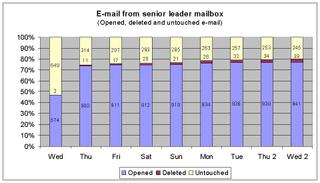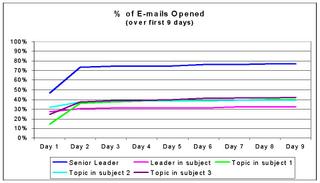Last time I wrote about plans to check read receipts from e-mails sent from leaders of the firm. I was expecting a boost in opened e-mails from those leaders, compared to those sent from our "generic" mailbox. I was surprised by the size of the leap. Here's the data from an e-mail from the North American leader to all North American employees. (By the way, does everyone know that you can click on the tables to open up a large version?)

It pays to have the right messenger -- these numbers are nearly twice as good as the average. Here's a comparison between this message and all the other e-mails for which I've gathered read receipt data.

(Not sure why this is one won't open to a large version. Working on it.)
Now, there are a lot of differences among these messages aside from the messenger. They were sent to different audiences and the content was different. It's likely that the senior leader message was simply more important and interesting than the others.
However, I'd argue that the differences among the lower four messages reinforce the similarity of readership. The four lower messages all received essentially identical attention despite variations in audience and content. The North American leader message response is starkly different.
I'll do another check of messages from the leader mailbox when I have a chance. I hope to get a less compelling message to check -- something that is less interesting in itself, to see how people respond.
So, what good is this information? Here are a few thoughts:
- It helps manage expectations on message penetration.
- If you can isolate readership levels you can do a better job of judging what other factors are effective in your messages. Let's say I send two different messages, each asking employees to take a survey. I know from read receipts that 40 percent of employees read each of them, but one message drove 30 percent of employees to comply and the other just 20 percent. I can explore the message content, timing or other factors to see what drove the higher compliance.
- I was asked how many dial-in ports we might need if we asked all North American employees to attend a conference call with the North American leader. If I'd had only the earlier read receipt data I may have guessed that enough ports for half the employees would be plenty, since fewer than half of most e-mails are even opened. Because I had seen that more than 75 percent of North American employees opened the leader's most recent message, I increased my estimate.
- It sets a baseline and a goal for all messages. If I know I can reach 75 or 80 percent of employees given the right message and the right messenger, then I can be a more strategic messenger.
- The knowledge also creates a greater responsibility. Maybe I can reach all those people, but do I want to? Are all messages equal? Would my organization be more or less effective if I learned to get everyone to open and read every e-mail message sent? My role is also to protect my audience, so I think this data would drive better targeting of messages.
- At the very least, I now have a sense of what constitutes good and average message penetration -- and I didn't really know that before.
I've recently had HR give me a list of all employees by e-mail address, level, location and other data. I can now map my read receipts to this data to discover different response rates based on those factors. Are they more or less likely to read it in Europe? Do managers read more messages than vice presidents? As I've said before, a little data goes a long, long way, and you never know how handy it will be until you have it.
My next post will provide the remaining data from my post-conference session survey. Then, I'll be helping my father-in-law conduct a survey for a small social-and-sports club he belongs to, using surveymonkey.com. That will probably be worth a few laughs here at standonabox.
After that, I'm not sure -- I'm moving to a new job at a different firm in September. I expect it to have a large measurement component, which you will be able to read about here. Wish me luck!
